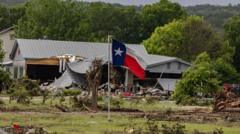In a grim update, the death toll from the floods in Mokwa, Nigeria, has surpassed 200, with 500 individuals still unaccounted for. Rescue efforts have been abandoned, prompting concerns about public health due to unburied bodies, as local economies struggle under the dual impact of loss and destruction from the floodwaters.
Catastrophic Floods in Nigeria Claim Over 200 Lives as Rescue Efforts Halt

Catastrophic Floods in Nigeria Claim Over 200 Lives as Rescue Efforts Halt
Severe flooding in Mokwa, Niger State leads to a tragic death toll, with ongoing search operations revealing the extent of the devastation.
The catastrophic flooding in Nigeria's Mokwa town has become one of the deadliest natural disasters in recent memory, claiming over 200 lives, according to local authorities. Following torrential rain that struck the area on Thursday, the floodwaters surged through towns such as Tiffin Maza and Anguwan Hausawa, leading to widespread loss and despair. As officials continue to assess the damage, currently, about 500 residents remain missing.
Musa Kimboku, deputy chairman of the Mokwa Local Government, revealed that search and rescue operations have been halted as the authorities have concluded that no additional survivors are likely to be found. The scale of this disaster is being described as the worst in 60 years by locals and officials alike.
In an effort to prevent potential outbreaks of disease, Mokwa's district head mistakenly has announced intentions to begin digging out bodies that may still be submerged. Residents shared heartbreaking tales of their experiences as the flood tore through their homes. One man, Adamu Yusuf, recounted the moment he helplessly watched as the torrent swept away his wife and newborn child. "I survived because I could swim," he lamented, illustrating the desperate situation faced by many.
Another survivor, Saliu Sulaiman, expressed his economic ruin due to the flooding, reporting a loss of around $1,500 in goods just a day after their harvest. "The pressure of the water scared me from going back to save my proceeds," he lamented, emphasizing the devastating financial impact on local businesses that have now been destroyed.
The National Emergency Management Agency (Nema) has initiated the process of delivering relief packages to those who have been affected by the calamity. It has also reported that critical infrastructure such as roads and bridges have suffered extensive damage, stalling local economic activity and transportation routes.
The Nigerian Red Cross validated the dire circumstances, describing the floods as resulting in "significant loss of life and widespread distress" for the residents. Flooding is a tragic seasonal occurrence in Nigeria, particularly during the rainy season spanning from April to October, yet this year's events remind us all too starkly of the brutal reality of climate change's impact on vulnerable communities. In recent years, Nigeria has faced recurring flooding issues, with previous incidents claiming over 600 lives in 2022, as communities continue to grapple with the repercussions each rainy season brings.




















